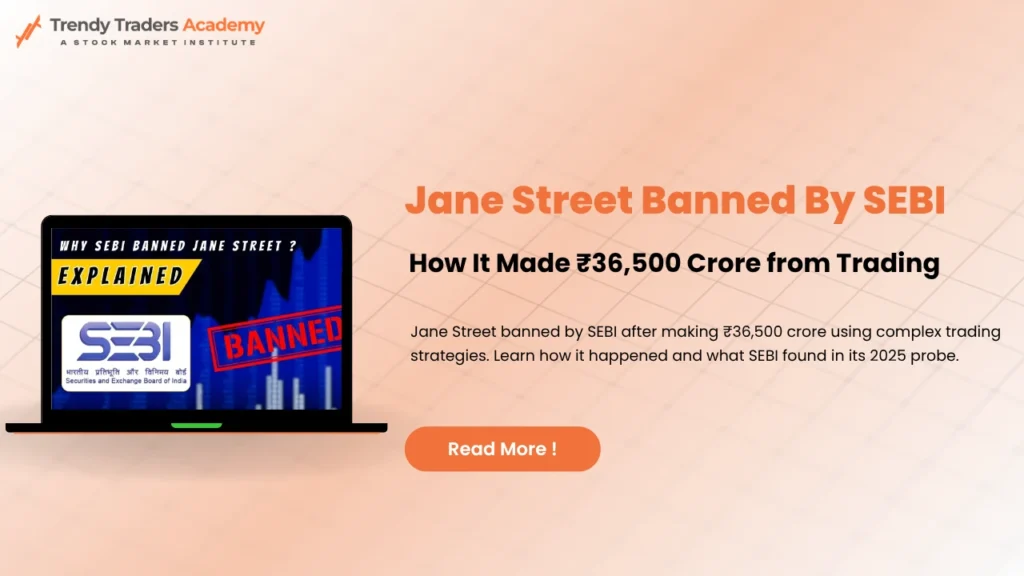
Jane Street Banned by SEBI: What It Means for You
On July 3, 2025, a major shockwave hit India’s financial markets—SEBI (Securities and Exchange Board of India) issued an interim order barring Jane Street India (part of Jane Street Capital) from trading in the Indian securities market. At the same time, regulators froze ₹48.4 billion (about $567 million) in alleged “unlawful gains.” This marked the first time India took such drastic action against a high-frequency foreign trading firm. Here’s what you and everyday investors need to know.
What Happened?
- Trading ban: SEBI restricted Jane Street India and related firms—JSI Investments, JSI2 Investments, Jane Street Singapore, and Jane Street Asia—from participating in the Indian securities market—directly or via brokers
- Funds impounded: Authorities seized ₹48.4bn (approx. $567 million), claiming these were ill‑gotten trading profits .
- Ongoing investigations: This is an interim order. Jane Street has 21 days to respond before the next hearing.
Why SEBI Took This Step
SEBI’s detailed 105‑page order alleges that Jane Street Capital used manipulative trading strategies on Bank Nifty and Nifty 50 index derivatives. Here’s how:
1. Morning Pump, Afternoon Dump
- The firm bought large quantities of Bank Nifty futures and stocks in the morning, pushing the index higher.
- Later in the day, they aggressively offloaded these positions, causing the index to drop.
- They held large options bets that profited regardless of which way the index moved
2. Expiry-day Tactics
On days when weekly index options expired, Jane Street allegedly manipulated closing prices in the final hour to boost their options strategy
3. Misleading Market Picture
Their large, concentrated trades created a false market sentiment, tricking insect of retail traders into making decisions based on artificial trends .
Why This Is a Big Deal
- Retail fallout: Small, everyday investors were likely hurt by these artificial swings, unknowingly trading at manipulated price levels .
- Harshest foreign crackdown: This is SEBI’s strongest move yet against a foreign algo trading firm, signaling strict regulatory enforcement.
- Market message: SEBI is sending a clear signal—manipulation won’t be tolerated, especially in derivatives .
Breaking It Down for Everyday Investors
Let’s unpack the scandal in plain terms:
Manipulation = Faking the Market Vibe
Imagine someone buys a bunch of apples in a local market early in the morning, making it seem demand is high. People rush to buy before prices jump, but then the buyer dumps all apples before noon. Everyone else loses.
Jane Street allegedly did the same with index trades—creating false signals and profiting off options, while others got caught in the crossfire.
Expiry-day tweaks
Options have expiry dates—plenty of trading occurs at close time. But deliberately influencing that final number? That’s cheating to benefit one’s own bets.
Unlawful Gains = Money That Doesn’t Belong
The ₹48.4bn SEBI seized isn’t just profit—it’s money made from strategies beyond legal and ethical norms.
How Other Firms Reacted (and How the Market Responded)
- Jane Street denies wrongdoing, and says it will challenge SEBI’s findings
- Banks froze accounts and blocked withdrawals pending SEBI approvals .
- Brokerages like Nuvama and Angel One dropped in value on SEBI’s action—indicating spillover concerns about market integrity
What It Means Going Ahead
For Retail Investors
- Feel safer—air-tight action from SEBI means better protection.
- Stay alert—SEBI suggests more scrutiny during future expiry days, so watch for games.
For Foreign Trading Firms
Jane Street SEBI ban will put firms like Citadel, Optiver, IMC under SEBI’s microscope. Expect tighter rules, more reporting, and end to aggressive expiry playbooks
For SEBI & Exchanges
- This sets a precedent. Exchanges are likely to introduce more safeguards—like discouraging expiry-day volume spikes.
- SEBI will probably roll out new rules to limit concentrated positions and intraday expiry manipulation.
Quick Glossary
- Derivatives: Financial contracts like futures/options whose value comes from an underlying asset (stocks or indices).
- Bank Nifty / Nifty 50: Indexes of top Indian banks and companies.
- Expiry day: The day when weekly/sp monthly index options contracts lapse.
- Futures & Options (F&O): Financial tools for speculation and hedging. Expiry manipulation in F&O can distort the cash markets too.
Lessons for Global Trading Firms and Regulators
The Jane Street banned by SEBI episode isn’t just an isolated event; it’s a wake-up call for global algorithmic and high-frequency trading firms operating in India. It demonstrates that regulatory bodies in emerging economies are now equipped with sophisticated surveillance systems, capable of identifying even the most subtle manipulative patterns. This builds pressure on foreign bodies to follow domestic rules, not just from a compliance point of view but also from the perspective of market ethics
Subsequently, this decision by SEBI will motivate other regulators across Asia to have similar strict, stern and aggressive laws in place, especially keeping retail investors interests in mind and protecting them. India with massive growing retail participation in the equity and derivatives market has sent a strong message that its market is not a playground for unauthorised and unchecked algorithms.
It also emphasizes the growing importance of behavioral finance in compliance checks. Regulators now look not only at what firms trade, but how those trades influence public perception, price discovery, and investor decision-making. As a result, there’s a shift from purely technical audits to examining market impact and intent.
What You Can Learn as an Investor
- Be wary during expiry days. High volatility around that time may not be driven purely by market fundamentals.
- Regulators are watching. SEBI is more active in policing expiry-day distortions.
- Choose credible brokers. Those working with top-tier firms offer better protection.
- Understand fees. When high-frequency firms dominate, it can impact spreads or liquidity—small costs for big effect.
Final Words
The Jane Street SEBI ban is more than a news headline—it’s a turning point. By freezing massive sums and banning foreign algorithmic traders, SEBI is signaling that market fairness to retail and domestic investors remains a priority. For you and me, this action adds a layer of confidence in a market that can often seem complex and opaque.
Whether you’re investing for the long term or dabbling in options, this episode underscores one truth: markets must be fair to be trusted. With stricter regulation and improved surveillance, we’re a step closer to ensuring a level playing field.
FAQ'S
Who is Jane Street Capital?
They’re a U.S.-based, quantitative trading powerhouse, active in global markets since 2000
What exactly did SEBI accuse them of?
SEBI says Jane Street India manipulated index prices by creating false volume signals and profited illegitimately on options, especially on expiry days
How much money is at stake?
Approximately ₹48.4 billion is seized—considered “unlawful gains” from January 2023 to March 2025
Is this ban permanent?
No—it’s temporary until final investigation concludes. Jane Street must respond within 21 days, and a full hearing is expected later.
Can Jane Street withdraw these funds?
Not without SEBI approval. The frozen money is in escrow and locked until appeals are settled











